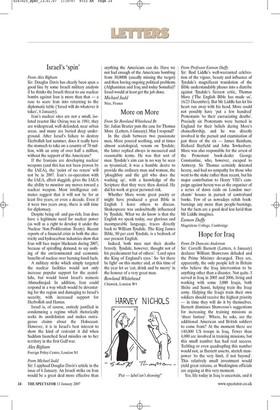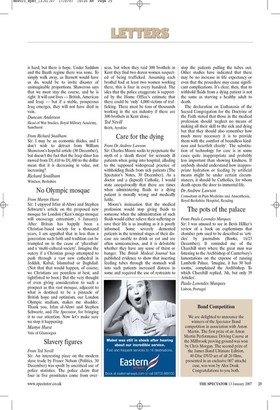Hope for Iraq
From Dr Duncan Anderson Sir: Correlli Barnett (Letters, 6 January) declares William Shawcross deluded and the Prime Minister deranged. They are, apparently, the only people left in Britain who believe the Iraq intervention to be anything other than a disaster. Not quite. I served in Iraq in 2005 and 2006, living and working with some 3,000 Iraqis, both Shiite and Sunni, helping train the Iraqi army. Helping the Iraqis train their own soldiers should receive the highest priority — in time they will do it by themselves. Barnett dismisses Shawcross's suggestions for increasing the training missions as 'sheer fantasy'. Where, he asks, are the additional American and British soldiers to come from? At the moment there are 140,000 US troops in Iraq. Fewer than 4,000 are involved in training missions, but this small number has had real success. Trebling or even quadrupling this number would not, as Barnett asserts, stretch manpower 'to the very limit, if not beyond'. This relatively small investment would yield great returns, as Washington officials are arguing at this very moment.
Yes, life today in Iraq is uncertain, and it is hard, but there is hope. Under Saddam and the Baath regime there was none. To simply walk away, as Barnett would have us do, would be to invite disaster of unimaginable proportions. Shawcross says that we must stay the course, and he is right. It will cost lives — British, American and Iraqi — but if a stable, prosperous Iraq emerges, they will not have died in vain.
Duncan Anderson Head of War Studies, Royal Military Academy, Sandhurst From Richard Snailham Sir: I may be an economic thicko, and I don't wish to detract from William Shawcross's hopeful article (30 December), but doesn't the fact that the Iraqi dinar has moved from D1,410 to D1,480 to the dollar mean that it is decreasing in value, not increasing?
Richard Snailharn Windsor, Berkshire























































 Previous page
Previous page